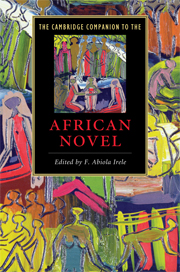Book contents
- Frontmatter
- 1 Introduction: perspectives on the African novel
- 2 The oral-literate interface
- 3 Chinua Achebe and the African novel
- 4 Protest and resistance
- 5 The Afrikaans novel
- 6 The African novel in Arabic
- 7 The francophone novel in North Africa
- 8 The francophone novel in sub-Saharan Africa
- 9 The African historical novel
- 10 Magical realism and the African novel
- 11 The African novel and the feminine condition
- 12 Autobiography and Bildungsroman in African literature
- 13 The postcolonial condition
- 14 New voices, emerging themes
- 15 The critical reception of the African novel
- Bibliography
- Index
9 - The African historical novel
Published online by Cambridge University Press: 28 January 2010
- Frontmatter
- 1 Introduction: perspectives on the African novel
- 2 The oral-literate interface
- 3 Chinua Achebe and the African novel
- 4 Protest and resistance
- 5 The Afrikaans novel
- 6 The African novel in Arabic
- 7 The francophone novel in North Africa
- 8 The francophone novel in sub-Saharan Africa
- 9 The African historical novel
- 10 Magical realism and the African novel
- 11 The African novel and the feminine condition
- 12 Autobiography and Bildungsroman in African literature
- 13 The postcolonial condition
- 14 New voices, emerging themes
- 15 The critical reception of the African novel
- Bibliography
- Index
Summary
The historical novel has been a crucial subgenre of the African novel from its very beginning. For example, the earliest African novel to have received widespread attention was Thomas Mofolo’s Chaka, drafted in the Sesotho language some time before 1910 (though not published in its full form until 1925). Chaka is a historical novel based on the career of the great Zulu leader, Chaka (aka Shaka), who was the principal chief of the Zulu nation from about 1816 until his death in 1828, leading the Zulus during the time in a number of campaigns of conquest that led to the establishment of an extensive empire in southern Africa. This novel thus provides an early reminder of the historical development of sophisticated, large-scale social and political organization in Africa completely apart from European intervention. In this sense, an important forerunner of novels such as the Ghanaian Ayi Kwei Armah’s The Healers (1978), which provides reminders of the achievements of the Ashanti Empire in the nineteenth century, though the events it narrates (most centrally the Anglo– Ashanti war of 1873–4) led to the collapse of that empire. In addition to such examples of novels that center on specific events in African history, it is also the case that the African novel, as a whole, is more intensively engaged with politics and history than is its European counterpart. Among other things, the African novel itself received a tremendous injection of energy from the historical phenomenon of decolonization, which infused that novel with a sense of historical urgency and a desire to contribute to the construction of viable postcolonial cultural identities for the new African nations.
- Type
- Chapter
- Information
- The Cambridge Companion to the African Novel , pp. 141 - 158Publisher: Cambridge University PressPrint publication year: 2009
- 4
- Cited by

